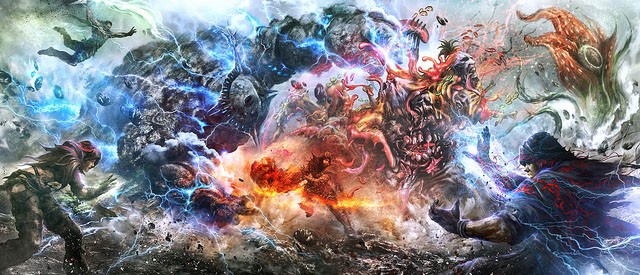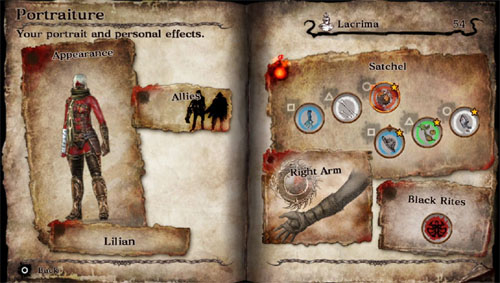

In Soul Sacrifice, players are cast as a nameless prisoner, waiting to be devoured by a monster named Magusar. The prisoner’s only hope of survival is to talk to and read a sentient book named Librom. Librom lets the prisoner relive the events of a nameless sorcerer from ages past.
Soul Sacrifice is composed of dozens and dozens of little missions scattered across three main categories. These categories are the single-player story campaign, Fellow Sorcerers (new tales/sorcerers are unlocked by playing the campaign), and Avalon Pacts. Several missions are lumped together under a common theme (e.g. focusing on a particular story point or sorcerer), and bits of story are revealed in between each mission of the campaign and Fellow Sorcerers sections.
Character customization will be a huge draw to the game for many. I don’t mean aesthetics (though you can do a reasonable amount of customizing that as well), I mean gameplay customization. For the sake of brevity, I will keep a description of the customization to a minimum. Just know that there is a whole lot more going on than what I relay here.

Players can customize their Satchel, Right Arm, Black Rites, and Allies. The Satchel is basically the spell casting system of the game. Six “offerings” (these are spells, weapons, and whatever you use to fight enemies) can be equipped at any given time and can be swapped whenever you want outside of a mission. There’s a ridiculous amount of offerings in the game - so many, I can’t even guess an accurate number - and many offerings can be combined with others to get new offerings. Players can also “boost” offerings by combining two of the same type to get a ranked up offering.
The Right Arm is the passive skills system. “Sigils” can be unlocked and equipped in your arm which can boost a whole variety of things (e.g. defense bonuses, offense bonuses, offering effect bonuses). Sigils are gained by saving or sacrificing a specified amount of certain monsters - the details of a sigil will reveal this information. Black Rites, on the other hand, are crazy strong spells players can use after their health gets to a critical point on a mission. There are permanent and punishing debuffs to the player that used them, but players can erase that harsh effect by using “lacrima,” a limited currency that you get from completing missions. Lacrima is used to correct all sorts of boo-boos, and you’ll be glad the game has such a system in place. Allies are companions players can select from a list of companions to accompany them on Avalon Pacts in single-player (they are not available in co-op play). Allies are unlocked through completing certain story points or saving bosses.
Sound complicated? It is, a little, but it’s also awesome. Very little of the customization is explained, so make sure you spend a fair amount of time looking at the detail screens and reading any text that the game offers you. What about the actual gameplay, though?
As I said before, gameplay is comprised solely of missions. When all is said and done, the single-player experience is quite similar to the co-op experience. You choose a mission and you get put on contained map with an objective. The objective is usually to kill X number of monsters or defeat Y boss. When a smaller enemy dies, players have an option of saving or sacrificing it. Not only does this give them essence (or XP) to their next Divine or Dark level, but saving an enemy will give them a defense boost and heal them while sacrificing will give them a magic boost and give them back more charges on their offerings. When a mission is completed, players are ranked on their progress by a point system. Higher ranks nets more offerings as rewards. All missions are repeatable, so you can (and will) go back and replay them to farm offerings.
Avalon Pacts is the co-op portion of the game (it’s also available to play in single-player). It’s unlocked after completing the first six missions of the game (the Sortiara arc). After it’s unlocked, players can create or join an online or Ad Hoc lobby. The lobby leader sets the mission for the party and once all players are ready can start the mission. Pretty much everything (offerings, essence levels, etc.) is carried back to the single-player campaign. For more information on specifics of co-op connectivity and gameplay, check out our Soul Sacrifice FAQ.
There are upsides and downsides to both single-player and co-op games. As for co-op, on the one hand, playing with your friends can be really fun. I played a game with Andrew and DJ, and since Andrew knows way more about the game he was telling us about elemental chains and crazy stuff like that. Going in with a group of friends with a strategy can be quite a ride. There’s also some offerings that encourage or require cooperative play (offerings that benefit other party members or require two people to utilize). The Avalon Pacts, however, don’t have much of a story, which I quite enjoyed on the single-player side of things. Some general complaints I had about Soul Sacrifice was that after awhile it began to feel really repetitive. A handful of maps and enemy skins are repeated over and over again in various combinations for the missions. You’ll even see the same bosses many times, but with different levels of difficulty. Every once in awhile a new one will be thrown into the rotation, but get used to seeing more of the same again and again.
In general, I found the character customization to be quite enjoyable, and the combat interesting for a time. I really like the story-telling aspect of the game as well; however, the repetitiveness of maps, enemies, and objectives began to greatly detract from the game after awhile. Soul Sacrifice is a good game, but it could’ve been an amazing game if a bit more variety had been involved. If too many Avalon Pacts are tackled in a row, the game begins to feel like a bit of a grindfest. Still, it’s a very enjoyable game to play a mission or two with some friends when you have some spare time. And if repetition doesn't phase you, then get ready to sacrifice a whole bunch of your free time.